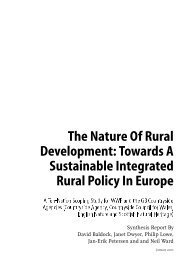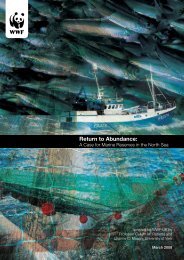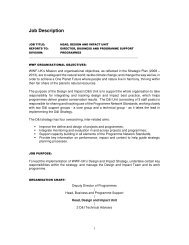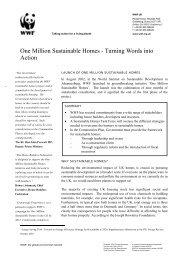Influencing Power - WWF UK
Influencing Power - WWF UK
Influencing Power - WWF UK
- No tags were found...
Create successful ePaper yourself
Turn your PDF publications into a flip-book with our unique Google optimized e-Paper software.
<strong>Influencing</strong> <strong>Power</strong>Results and FindingsSome companies do allude to the systemsand structures that lie behind theirapproach:— Chevron, ExxonMobil, Ford, Johnson &Johnson and Texas Instruments allreport that their lobbying is governed bya board-level committee, but providelittle additional detail on how thisoperates.— Other companies like General Electricprefer to describe a more generalphilosophy underlying their approachto the issues without actually describingthe specific governance process. 43— Only a handful, including BP, addressboth.MaterialityCompanies have often rebuffed previousefforts to encourage the opening of theirlobbying to public scrutiny, not leastbecause of the bureaucratic burden ofproviding this transparency. As Shell arguedin its thoughtful response to the GreenAlliance publication: 44 ‘[We] are not surethat minuting all dialogue and opinions ona website would take us much furtherforward.’In the year since this exchange, the conceptof materiality (see Panel 3.4) has becomeincreasingly central to company approachesto CR. As part of their efforts to rationaliseand prioritise, companies are focusing onidentifying, managing and reporting on asmaller set of issues that are material totheir business and to key stakeholders.This approach is also relevant to lobbying,although so far most companies fail toprovide any rationale for the selection ofpolicy issues they report on. HP, however,provides more context than most, explicitlyidentifying four major issues material to itsbusiness including: access to markets, e-commerce, electronics recycling andcompetitiveness, and providing policypositions for all four.Society as JudgeThe draft of this report was reviewed byroughly 20 CR experts from academia,business, government and civil society.One concern raised by several reviewerswas that the picture we paint is too ‘rosy’.Some pointed out that we focus only onthe largest companies. Others noted ourranking is based on published information,which by definition is selective. A thirdgroup highlighted disconnects stemmingfrom the role of industry associations.We acknowledge these limitations (seeSection 2.3).Interestingly, some of the most forcefulconcerns came from commentators frombusiness (although admittedly from theCR arena). Many felt that the companiesthat received high ratings in our analysisdid not merit this ranking. For example,Chevron’s role in the Extractive IndustriesTransparency Initiative, Ford’s lobbying onclimate change, BP’s activities in hostgovernment agreements for the BTCPipeline project and Total’s continuedactivities in Burma were all seen as majorissues that potentially invalidated ourresults. Two of our reviewers, one frombusiness and one from the investmentcommunity, helped articulate their reasonsfor this unease:— ’I find my position hard, if notimpossible, to prove but my instinct andgeneral knowledge of the corporateworld tells me that at very best nosingle company deserves to be ratedabove developing.’— ’Some of these companies haveleadership roles in industry associations,which can set up a structural tensionbetween those in the company who aretrying to uphold the principles you’veunderscored, and the often conflictingprinciples of protecting industry againstperceived threats from groups likeNGOs. I’m not so sure disconnects stemfrom lack of communication so much asinconsistency or competing objectives.’We also grappled with similar concerns.Yet we concluded that our focus should beon assessing whether companies aretransparent, focus on material issues andmake the link between their policypositions and their values and principles.With this information, we believe societycan make a judgement about theresponsibility of a company’s lobbyingactivities.Defining Materiality15Understanding what constitutes ‘material’social and environmental issues for aparticular company has emerged as amajor challenge in corporateresponsibility.In very simple terms, a material issue isone that is important — one which couldaffect perceptions about a company andany decisions taken (whether by investors,employees, neighbours, NGOs or otherstakeholders) as a result. 45 Defining thethreshold of what is or is not material,however, is no obvious task. What ismaterial varies between and even withinindustries based on the (ever-changing)context in which a company operates —and is usually only easily identified inhindsight.Nonetheless some basic parameters havebeen developed to help companies identifymaterial issues. AccountAbility, forexample, has argued that in order todetermine the materiality of particularissues, five tests can be applied. 46 Theseinclude considering whether issues areassociated with:— significant direct short-termfinancial impacts— specific policy positions that thecompany has developed— what peer companies have deemedas material— stakeholder behaviour andconcerns— societal ‘norms’ that are developingeither through regulation (current andpredicted), investment practices orinternational developments.Panel 3.4Panel 3.3














![[PDF] Causes for concern: chemicals and wildlife - WWF UK](https://img.yumpu.com/31929970/1/184x260/pdf-causes-for-concern-chemicals-and-wildlife-wwf-uk.jpg?quality=85)

